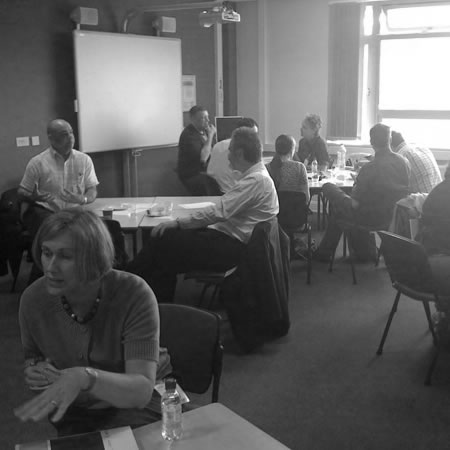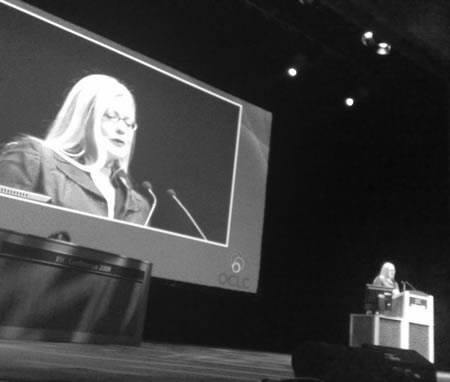I do enjoy Handheld Learning and 2009 was no exception. Three days of mobile learning stuff, presentations, discussions, networking and people.
Day one, Monday, is the free day. Anyone can go and they don’t need to pay any conference fee. This is a great idea if you’re interested in going to Handheld Learning and want to try it without spending lots on a conference fee, hotel accommodation etc…
I arrived with only a little time to spare before the HHECKL session started. The session was a variation on the Top Gear Cool Wall, but using gadgets and phones rather than cars.

With four of us presenting, we did initially outnumber the audience. After a slow start once we got going the process did start to work and the discussion was fast and furious.
I was surprised that some delegates weren’t willing to make a judgement on a device they hadn’t used. It wasn’t as though we were asking whether the devices were good for learing, whether they were cool or uncool. We did cover learning, but the focus was the device and the technology – which makes a change.
At the end we had split devices between those we and the audience considered cool and those we considered uncool. We allowed some selected members of the audience to move a device; the most amusing part was when a rather young member of the audience was asked to move a device, moved the Sony VAIO P Series from the Cool to the Uncool section. Asked why, he replied “because James owns it”.
After HHECKL it was time for lunch. As day one is the free day, there is no free lunch. With very few places to actually sit down in the venue, we decided that we would give the sandwiches a miss and pop out for something to eat. Were we in for a lucky time, up Whitecross Street (a few minutes from the Brewery venue) there was a bundle of street vendors selling all kinds of different types of food, a real multi-cultural treat for everyone. With the local pub allowing us to bring in food, we had somewhere to sit, eat (and grab a beer).
One thing that many conferences, and Handheld Learning is not alone in this, is providing social spaces for conference delegates. Though I guess a lot of delegates love attending a packed programme, many who attend want to talk and discuss issues relating to them and their institutions. Providing a place (with coffee obviously) would allow for more networking and discussion. It’s not that I don’t think the programme is not useful or relevant, sometimes you gain by discussion and talking. Actually that is something that presenters may want to think about when running their presentations and workshops. Bizarrely enough the few tables and chairs available were more often then not taken up with people working and checking e-mail!!! It’s a conference, watch the presentations, network, chat, but if you need to work, go back to work!
The afternoon saw the Pecha Kucha. Simply put you show twenty slides with only twenty seconds for each slide. Sounds simple, but surprising how some people don’t understand this simple concept or don’t know how to use Powerpoint transitions.
One of the good things about the Pecha Kucha is that if one of the presenters is really boring or on a subject you don’t like you only need to wait six minutes for the next one. Though it’s surprising how six minutes can appear like thirty! I hope I didn’t bore the audience with my two Pecha Kuchas, my first was on the Future of Learning, whilst my second (and the last one of the day) was on Twenty Web 2.0 Apps for Learning.
I really enjoyed Tony Vincent’s presentation, his style of presentation and slides are superb. Alas I was going to miss his session the following day as I was presenting at the same time. If you have never done a Pecha Kucha before I would suggest that next year if it is on you give it a try. Choose something you are passionate about. Don’t worry too much about the slides, sometimes pictures work better than words.
Reflecting on both HHECKL and the Pecha Kucha has given me an idea for next year’s conference with a Britain has Handheld Talent type session. Start talking about your project, concept, ideas and see if you can last before you get the big X from one of a panel of judges.
Being involved in both HHECKL and Pecha Kucha was really enjoyable and one of the many highlights for me of the Handheld Learning Conference.
That night after an (okay) meal at a local Italian restaurant it was the Awards Evening. I was up for two awards and alas I was going to go away with nothing… ah well maybe next year! Thanks to everyone who voted for me.
A lot has been written about the awards party my view is that I believe that the awards event is an important event, yes I was up for two awards this year which was a real honour and recognition from the community about the work I do. I also went to last year’s awards ceremony and supported colleagues (even if I wasn’t up for anything last year). I also supported this year’s awards by “buying” a table. There aren’t many awards for mobile learning and it is important to the community that we recognise the innovative work that they are doing. As a result it’s important that we also support these awards. I agree with Graham Brown Martin, it is sad that we lose this focus when we discuss coffee and the price of drinks.
After a good night out at the awards it was back to the hotel and bed…
More later…







